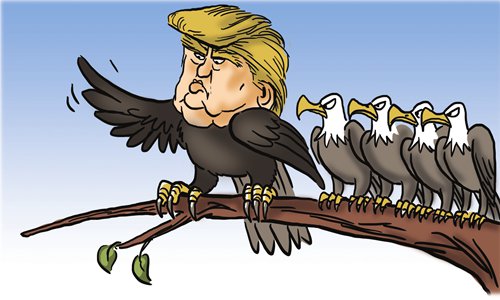
Until just a few weeks ago, the legitimate concerns about President Donald Trump’s prejudices against free trade, and his predilection for substituting military force for diplomacy, were tempered by some of the other members of his team. As of today, three of the most prominent members of this group have resigned or been fired. As substitutes, people with instincts very similar to Trump’s have been promoted. Because of this, far from dialing down the tension, they could encourage decisions that might put international stability at risk. If we were worried about the course of decision-making in the White House before, the concerns have now increased.
On March 6, Gary Cohn, a prestigious Wall Street banker who was serving as president of the National Economic Council and thus as a principal presidential adviser on these issues, resigned his position. Reason: the announcement by Trump of the imposition of tariffs of 25 percent on steel imports and 10 percent on aluminum, which Cohn opposed. Several exceptions were subsequently announced, but the unilateral decision constituted a serious blow to the multilateral trading system. Cohn was replaced by a television commentator with little experience, and his departure increased the influence of Wilbur Ross, the secretary of commerce, and of the presidential adviser on these issues, Peter Navarro, who both seemed to have no qualms about the possibility of starting a trade war, particularly with China.
One week later, via a Twitter message, Trump fired Secretary of State Rex Tillerson, who has held various positions on several key foreign policy issues, and on top of that, had not been able to demonstrate leadership in this area. The replacement that was announced is Mike Pompeo, the director of the CIA, a “hawk” on national security issues who will have to be confirmed by the Senate. Pompeo will be replaced at the CIA by Gina Haspel, who in the past has supported the use of torture in the interrogation of terrorism suspects.
This was followed just a few days later by the resignation of Lt. Gen. H. R. McMaster as the national security advisor, a key post on the White House team. McMaster is respected for his knowledge and understanding in dealing with such sensitive issues. His replacement, as of April 6, will be John Bolton, former ambassador to the United Nations, who is known not only for his rigid ideas, but also for his confrontational style and his propensity for the use of force.
Now, the only official who is rational enough and has a background broad enough to restrain the impulses of Trump, Pompeo and Bolton is the secretary of defense, Gen. James Mattis. It has been reported that Mattis has expressed doubts about whether it will be possible to work with Bolton. But even though he may be staying in his position, there is no doubt that the balance of forces has tilted, in trade as well as in foreign policy and national security, toward individuals and positions much more extreme than those that have prevailed up to now. Hence the disquiet, above all among U.S. allies, who are more and more insecure about how to manage their relationship with the world’s leading power.
On the immediate horizon, there are big challenges, such as the announced meeting between Trump and the North Korean dictator Kim Jong Un; it will be difficult to get anything positive out of this if it is not planned and carried out with extreme care. Also this month, it is possible that the president will declare Iran to be out of compliance with the nuclear agreement with the United States, China, Russia, France, the United Kingdom and Germany. This would mean the re-imposition of sanctions by the U.S. and the possibility that the arrangement might collapse, something particularly worrying for the Europeans. Added to this, among other issues, are the careless management of relations with China and Russia, contradictory signals about NATO, and the disdain for several multilateral organizations, including the United Nations and the World Trade Organization.
The agenda is extremely sensitive. Any miscalculation or carelessness might result in extremely serious consequences. The risk has always existed, but at this moment it has been exacerbated, and it is difficult to see how anything better can be expected in the medium term.

Leave a Reply
You must be logged in to post a comment.